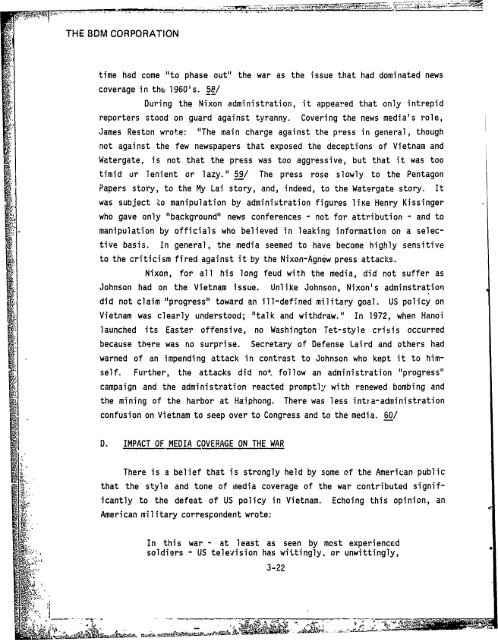policy - The Black Vault
policy - The Black Vault
policy - The Black Vault
You also want an ePaper? Increase the reach of your titles
YUMPU automatically turns print PDFs into web optimized ePapers that Google loves.
THE BDM CORPORATION<br />
time had come "to phase out" the war as the issue that had dominated news<br />
coverage in thc 1960's. 58/<br />
During the Nixon administration, it appeared that only intrepid<br />
reporters stood on guard against tyranny. Covering the news media's role,<br />
James Reston wrote: "<strong>The</strong> main charge against the press in general, though<br />
not against the few newspapers that exposed the deceptions of Vietnam and<br />
Watergate, is not that the press was too aggressive, but that it was too<br />
timid or lenient or lazy." 59/ <strong>The</strong> press rose slowly to the Pentagon<br />
Papers story, to the My Lai story, and, indeed, to the Watergate story. It<br />
was subject Co manipulation by administration figures liKe Henry Kissinger<br />
who gave only "background" news conferences - not for attribution - and to<br />
manipulation by officials who believed in leaking information on a selective<br />
basis. In general, the media seemed to have become highly sensitive<br />
to the criticism fired against it by the Nixon-Agnew press attacks.<br />
Nixon, for all his long feud with the media, did not suffer as<br />
Johnson had on the Vietnam issue. Unlike Johnson, Nixon's adminstration<br />
did not claim "progress" toward an ill-defined military goal. US <strong>policy</strong> on<br />
Vietnam was clearly understood; "talk and withdraw." In 1972, when Hanoi<br />
launched its Easter offensive, no Washington Tet-style crisis occurred<br />
because there was no surprise. Secretary of Defense Laird and others had<br />
warned of an impending attack in contrast to Johnson who kept it to himself.<br />
Further, the attacks did not follow an administration "progress"<br />
campaign and the administration reacted promptly with renewed bombing and<br />
the mining of the harbor at Haiphong. <strong>The</strong>re was less intra-administration<br />
confusion on Vietnam to seep over to Congress and to the media. 60/<br />
D. IMPACT OF MEDIA COVERAGE ON THE WAR<br />
ii-. In<br />
I __<br />
<strong>The</strong>re is a belief that is strongly held by some of the American public<br />
that the style and tone of media coverage of the war contributed significantly<br />
to the defeat of US <strong>policy</strong> in Vietnam. Echoing this opinion, an<br />
American military correspondent wrote:<br />
this war - at least as seen by most experienced<br />
soldiers - US television has wittingly, or unwittingly,<br />
3-22<br />
_
















